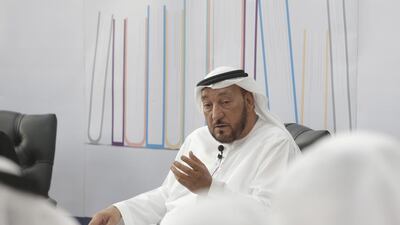From utilising his vantage point over Grand Mosque attack to providing a voice for the nation's children to pass on wisdom to new generations, the writer's mission was clear.
ABU DHABI // Abdullah Abdulrahman understands the power of the written word. As an ambitious 24-year-old journalist, he risked life and limb to report from Mecca as a rebel faction seized control of the Grand Mosque in 1979.
Now 62, he has swapped front-line news for the far safer, but equally important, task of chronicling the UAE’s history – as seen through the eyes of Emiratis, rather than visitors.
“There were only four or five ancient texts written by sons of the Emirates, the rest were reports by British visitors, Orientalists,” says Abdulrahman.
The writer published his first history books in 1988. It took him five years to gather all the information he wanted for The Emirates in the Memory of its Sons series.
“I started aiming to cover a historical gap that faces researchers when writing about UAE history; the cultural and social history was not there,” he says. “It was a series of oral histories through dialogue with senior citizens. The narratives varied and fact checking was time consuming.”
His most recent project extends beyond historical events and archaeology to cover the ancient Bedouin economic system and how it developed as they moved to the city, until it adapted to modern international standards.
Abdulrahman has written and co-authored more than 10 books, some of which have been included in university curriculums, and he continues to work on more titles.
As a journalist with Aletihad, the Arabic language sister paper of The National, he was the only reporter present when 500 armed rebels, led by Juhayman Al Otaybi, a Saudi religious activist and former militant, seized the Grand Mosque on November 20, 1979 to protest against the Saudi monarchy and royal family.
Abdulrahman was able to visit the city and report what was happening from a vantage point in the mountains surrounding Mecca. “It was the Islamic New Year and they expected King Khalid to be praying at the mosque,” said Abdulrahman. “It was very painful the invasion of the holy haram.
"I took the risk to go to Mecca. I was the only reporter in the world there and the headlines that were taken by international news wires used to say 'Al Ittihad correspondent reports from Mecca'."
When he arrived in Jeddah, he was told by ministerial officials that no one was allowed into Mecca and that he had to follow what was happening through official press releases only.
“I thought, ‘What is the point of me being here? I have to find a way’. So I took a taxi to Mecca, it took maybe six or seven hours to reach, although the distance is one hour only, but because of the congestion and checkpoints.
“I decided to go up the mountain to get a view of what was going on. There were no modern buildings back then.
“From there I could see the central yard of the haram and I saw the armoured vehicles, tanks, and ambulances picking up the injured and the dead.”
At the time, officials were saying they had already defeated the rebels, says Abdulrahman.
That was “contrary to the reality I saw in front of me, how did they defeat them?”
“So I reported the image I saw in front of me,” he says.
For 10 days, he was based at a hotel in Jeddah and took a taxi every morning to Mecca, which he described as an adventure in itself, returning to file his story in the evening.
He interviewed people and grabbed any news line he could get before sending the information to his editors.
"They warned me not to use a telephone because they were all monitored, but what can I do?" he says. "I was the only reporter there who could see what's happening. After that they banned Al Ittihad from entering Saudi. I think today they forgive me for violating the instructions."
The two-week siege ended after Saudi special forces, assisted by Pakistan’s special services group, entered the site. Al Otaybi was executed on January 9, 1980.
hdajani@thenational.ae


